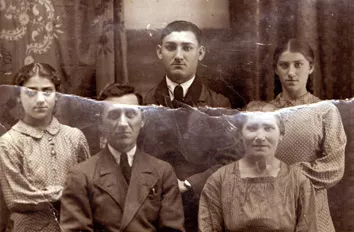This is me and my family. Sitting: my father Efim Melamed, my mother Leya Melamed. Standing: from left to right: I, Faina Melamed, my brother Boris Melamed, my sister Esfir Melamed. This photo was taken in Samarkand in 1940.
My parents tried to observe Jewish traditions when we were in Samarkand. My mother went to the synagogue on Sabbath and holidays. My father didn't go to the synagogue. Probably his position didn't allow him to, but he preyed usually at home with his tallit and tefillin on. My father had a prayer book and my mother had a different one. Before Sabbath my sister and I helped my mother to do the apartment. My mother cooked a lot of food and we prepared for celebration of Sabbath. My mother lit two candles. My brother and sister could understand and speak Yiddish well while I could only understand it. Our preparations to Pesach usually took several days. We cleaned off any breadcrumbs in the apartment. We used special crockery. I remember well big plates with portioners and special inscriptions in Hebrew instructing what food should be placed in them. At Pesach we all reclined on cushions around the fireplace on the floor. I found it funny when my father recited prayers. Once at Pesach my father was reciting a prayer in Hebrew from some special book [editor's note: she refers to the Haggadah here] and we were singing songs. My brother and sister were very serious about it, but I burst into laughter all of a sudden. My father got very offended.
We didn't face any anti-Semitism in Samarkand before World War II. We observed our Jewish holidays, Uzbek people celebrated theirs and Russians had their celebrations. We celebrated Soviet holidays - 1 May, October Revolution Day all together. Housewives of all nationalities came to the market where they could buy whatever food each of them needed. There were shochets that slaughtered chickens, cows and sheep. We bought meat from them. My mother bought milk from Buchara Jews. She knew that they observed kashrut and they kept milk in a special bucket that they never used for other products.
Arrests in 1937 [during Great Terror] didn't affect our family. However, we had a neighbor, who came to us one night and told us with tears in her eyes that her husband Volodia had been arrested. Her husband was a communist. He was a Party official. Some time later she was ordered to move out of their apartment and they moved into a basement.
After I finished the 5th form in 1941 the Great Patriotic War began. I remember the day when the war began. Our relatives from Kazakhstan were visiting us. We went to swim in the lake: I, Esfir, Boris, Ania, my mother's cousin sister and Sopha, my mother's niece. We were going past the club where we used to go dancing in the evening when we heard Levitan on the radio. He broke the news that the war began. My father was 46 and had stomach ulcer, but he said he didn't want to stay at home when such disaster happened. He felt he was bound to go to the front in 1942. My brother Boris was mobilized to the army in 1943 and in a month went to the front.
My mother kept praying for Boris and for father. She lit an oil wick (there were no candles) and recited prayers. My father perished in 1943. We received a notification that my father perished defending our Motherland. My mother kept this notification for a long time, but it got lost when we were moving into a new apartment and I don't know where my father perished. My brother was an attendant and then a medical nurse assistant in hospital. He was wounded and was taken to hospital and then demobilized. He returned home in spring 1945.














